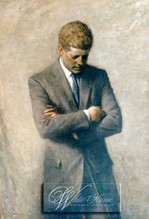Americans are by nature an optimistic people.
We like to be told, when things are tough, that they’re not that tough, that we can tackle our problems, forge ahead, even reach the Moon.
Americans loved Ronald Reagan for that reason. It wasn’t so much the direction he took us in as the sunny way he took us there. We had already decided we agreed with him. He validated that, and validated us.
It drove Democrats crazy to think that this lazy man, this actor, could with a sunny disposition turn the whole country inside-out on behalf of policies which, to them, seemed hopelessly moronic.
Bottom rail on top now.
To Republicans this election must seem like Bizarro World. Suddenly
they’re the ones calling on Americans not to abandon the past. They’re
saying it’s about competence. They’re saying we have to be realistic,
not rely on sunny rhetoric to get through this winter of our discontent. Be afraid, they say. Be very afraid.
Americans are not fearful people.
It is very unusual for Americans to prefer gloom, but in fact that
is what we’ve done, for the most part, under the Nixon Thesis. Hubert Humphrey, who got just 43% of the vote against the
angry Nixon-Wallace hordes (but might have won with just 1% more in the
right places) was a Happy Warrior, always smiling, glad-handing, filled
with that can-do attitude. But the New Deal was over, and Americans
were tired of rushing forward when their cities were burning and their
kids were running away.
These policies, however, are today called Reaganism, taking their
name from the sunny disposition of Ronald Reagan, whose regime
validated them in the minds of voters, and validate them still. This is
natural. While Humphrey actually came to political prominence under
Harry Truman, you wouldn’t see him calling his views Trumanism, because
Truman was, well, pretty irascible. It was the New Deal he was selling,
the New Deal of FDR. (Roosevelt-ism never sold as a word.) Truman validated the New Deal, by winning re-election almost
despite himself, simply because people had come to believe in his
ideology.
Keith Olbermann noted a few days ago it’s been a century since
Americans rejected the great speaker for the more modest man, but that
was in a day when we believed what the modest man, William Howard Taft,
was selling, which was the modest reform of Teddy Roosevelt’s
Progressivism. Today, by contrast, the Nixon Thesis lies in ruins, on
every level. Republicans are quitting Congress in near-record numbers.
They’re not showing up for the primaries. They’re not digging deep into
their pockets for campaign contributions. They know that, in an honest
election, they’re dead. (And they need to know that with a dishonest, stolen election, we’ll kill them.)
Thesis elections are almost never close. A 57-43
blow-out with Wallace added-in. The FDR landslide was similar. So was McKinley’s win over
Bryan. My son likes to note how small a portion of the total popular
vote was won by Abraham Lincoln, but he dominated the Electoral
College. The system worked.
The system working is the theme of all Thesis
Elections. Jackson, Lincoln, the Progressives, the New Dealers, and
even the Movement Conservatives were all about making the system work.
Whether that was the electoral system, our system of rights, the
economic system, or the social system, making the system work has
always been the Great American Theme.
And so it is today. What is at issue is our democratic system. What is at stake is nothing less than the fate of the world.
Democrats need to remember that. Be optimistic, promise to preserve
the system. Spend the next several months putting meat on those bones
and don’t just depend on the man’s charisma, but the charisma of what
he believes in, and on our belief that solutions are possible.
Don’t settle for victory. Demand a mandate.










